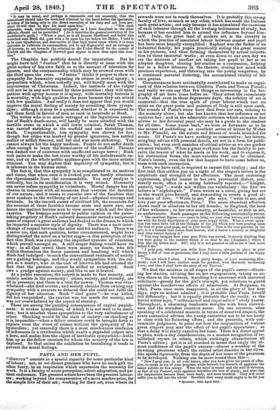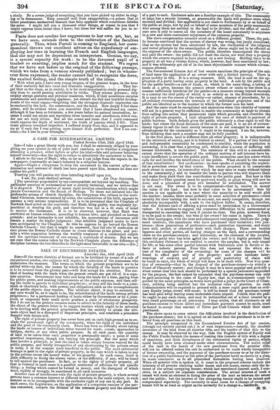PASTA AND HER PUPIL.
"GENIUS" consists in a special capacity for some particular kind of labour; not, as soi-disant geniuses who have no such gift too often fancy, in an inspiration which supersedes the necessity for work. It is a faculty of acute perception, adroit adaptation, and pa- tient endurance. The greatest artists have been the greatest labour-
s; working beyond the compensation of a mere market-price, for the simple love of their art ; working for their art, even where its
rewards were not to reach themselves. It is probably this strong faculty of love, as much as any other, which has made the Italians such great artists; not only because it has stimulated the exertions of each labourer through all the livelong:tediousness of study, but because it has enabled him to extend the influence beyond him- self. Italy, the great land of modern art, is the country in which the practice of associated labour between master and pupil has been most happily exemplified : Raphael was the father of an industrial family, his pupils practically aiding the great master in his pictures, and thus forming themselves by actual coopera- tion in those immortal works ; so even down to our own day we see the mistress of another art taking her pupil to her as an adopted daughter, sharing her studies as a companion, helping her as a fellow labourer in the theatre, storing her mind with precious experience, and throwing into the young songstress, by a continued parental fostering, the accumulated vitality of her own genius.
Circumstances have accidentally contributed to make us cogni- sant of this relation between Giuditta Pasta and Teresa Parodi ; and verily we can say that few things so interesting in the bio- graphy of art have come before us. They attest the consolatory truth, that even in these degenerate days, the nobility of art is immortal—that the true spirit of pious labour which cast its spirit on the great poets and painters of Italy is still upon earth. The sounds of Pasta's voice have died from our ears, echoing to the memory alone ; but she has known that her influence on art outlives her ; and in the admirable criticism which animates her advice to her favoured pupil she may be a guide to the student for all time. Some years back,* we were so fortunate as to be the means of publishing an excellent series of letters by Weber to Mr. Planche, on the nature and fitness of words intended for music. Of Pasta's we have nothing so consecutive : her letters, mingling advice with personal details, are not in a form for publi- cation; but even such snatches of critical advice as we can gather are most valuable. When a great workman has the faculty to per- ceive the reason of what he needs in his work, and to express it, his instruction forms the most valuable that can be obtained. Pasta's letters, even the few that happen to have come before us, teem with such instruction.
Love, we have said, is required to impart full vitality ; and the first trait that strikes you on a sight of the singer's letters is the amplitude and strength of her affections. The most endearing expressions, playful names in her own provincial dialect, con- stantly recur, often in a string habitually repeated,—" Lisigne, pastove, tape "—words not within our vocabulary : the first we believe is" nightingale." Pasta writes as a sister, giving her art as she would give herself, and demanding in return a good al- lowance of love. "Write to me," she says, " write to me, and love your poor affectionate Pitta." The same abundant affection shows itself in allusions to her old friends; to England, the land of her welcomes ; to her own country, so beautiful, so rich in art, so unfortunate. Such passages as the following continually recur. " The excellent Signor — came to bring me your dear letters, and to console me with the lively description of your most happy &bat. What a sweet agita- tion you must have felt at the thought of the joy which you were pouring upon the soul of your good papa, and in your tinnily. This is the true guerdon in our art; it is a balsam that comes from heaven, and it leaves a memory so delightful that time cannot destroy it." "You may imagine how your poor Pitts was moved, in merely thinking that you were going to the country which is so dear to me, [England,] which I love like my native land. Ah! why is it not granted to me to see it once more before I die."
" I pray you, whenever you write from Palermo, always to place in your letters a leaf of rose or geranium, that I may have a little perfume of the happy land."
" The art which I adore. I have a pretty design, of Love enchaining Har- mony: now I will have another made for pendent, with Harmony enchaining Love; and thus I shall have the story of my Theresa."
We find the mistress in all stages of the pupil's career—direct- ing her studies, advising her on her engagements, taking an ac- tive share in the business, watching her successes with maternal solicitude—greedy for the girl's triumph, yet solicitous to guard against the mischievous effects of admiration. At Bergamo, in 1845, Pasta once more reappeared, in all the glory of her first days, says an ardent admirer : it is probable that Pasta herself felt differently ; but it is equally probable that she really, as the fervid writer says, "enthusiasaied and eniparadised" every hearer. Throughout, a charming bonhomie mirgles with keen shrewd- ness and the soundest common sense. On one occasion, after speaking of a celebrated maestro in terms of deserved respect, the acute counsellor advises the young cantatrice not to be too hasty to close with his flattering offers ; and she proceeds, with con- summate judgment, to point out how the conjunction of various great singers may mar the effect of her pupil's appearance ; so that a delay will really expedite her fame. There is a direct appeal to plain work-a-day considerations, to a modest recognition of es- tablished repute in others, which strikingly characterizes all Pasta's advice ; yet it is all couched in terms that imply the ut- most confidence of the pupil's success—almost a worship of the dawning greatness which the retired artist descries in her eleve. She speaks rigorously, from the depth of her sense of the greatness to be developed. Nothing can be more sound than this- " Now I pray you, in all your letters, after you have given me proofs of affec- tion, to speak to me of your progress, while beneath the warmth of applause the talent unfolds its fine energy. When the mind is sound and the soul is virtuous, as that of my Pastove, such applause redoubles the love of study; and alter that the inspirations become finer, more ready, and more truthful. They will never suffer you to fall into the triviaL Recollect that every truth ought to be for you * Spectator, 24th April 1841.
a study. Be a severe judge of everything that you have picked up either in sing- ing or in demeanour. Keep yourself well from exaggeration,—a poison that at times penetrates unobserved beneath that false applause which sometimes deludes the actor. I might tell yea a thousand other things, or repeat to you that I might express them better than I have; bat these few will suffice for you to re- member.'"
Pasta does not confine her suggestions to her own art, but, as we have seen, extends them to the cultivation of the faculties generally. Thus, when Parodi is coming to England, her corre- spondent throws out excellent advice on the expediency of em- ploying her time in learning the French and English languages, that she may not be dependent on interpreters. Genius, we say, is a special capacity for work : to be the favoured pupil of a teacher so exacting, implies much for the student. We regret that we have not before us the original of the following passage, which we take from a version already published ; but in whatso- ever form expressed, the reader cannot fail to recognize the force, the exalted feeling, and the simple truth of the ideas.
"With what pain I have seen young singers, of the greatest hopes, in the hour of their maturity fall into vocal and dramatic exaggeration. . . . They for- get that on the stage, as in society, it is far more important to study personal dig- nity than to excite passing admiration by tricks. They misuse grimace; they employ abrupt gestures and physical resources, which, if they sometimes surprise questionable and unreflecting applause, yet disturb the full and truthful develop- ments of the vocal organ,—forgetting that the strongest dramatic expression can be rendered by the look, the countenance, and the hand. How deeply I feel these points, will be evident when you remember that I have abandoned my career, although it has been so fortunate, a few years before its natural termination, be- cause I could not attain and reproduce those beauties and excellences which ren- der our art truly divine. Not all the sound and tones that I could command could express the depth of sentiment, the truth of passion which I felt. Thus many phrases remained imperfect. I suffered deeply from this, and it appeared to me as if each day I was getting more distant from perfection. Now [am con- soled,—for I live in your triumphs."



























 Previous page
Previous page